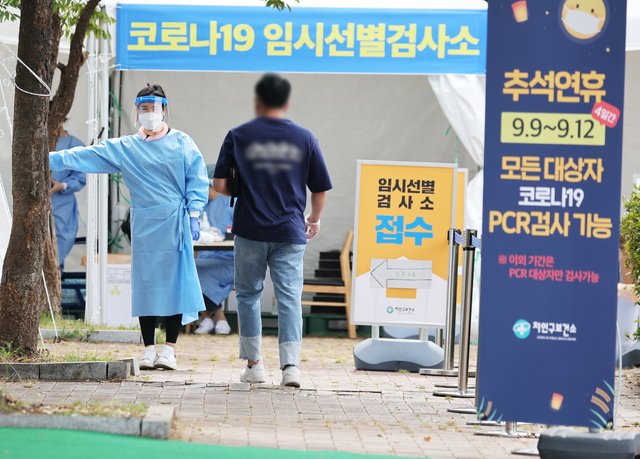
Experts are warning of a possible “twindemic” of seasonal flu and the coronavirus, starting in the fall.
The country is already seeing gradual rises in the number of people who are infected with seasonal influenza viruses.
According to the Korea Disease Control and Prevention Agency, in the fourth week of August, 4.7 out of 1,000 visitors to hospitals were reported to have influenza-like symptoms, up from 4.3 from a week ago and 3.3 five weeks ago.
The infection rate among minors are also relatively higher than that of adults. During the fourth week of August, the rate for children aged between 1 and 6 reached 6.3, while the rate for those aged between 7 and 12 came to 5.9. The rate for adolescents aged between 13 and 18 was the highest with 8.5.
The number of patients who have been hospitalized for respiratory infections also increased during the same period, from 94 patients to 665 patients, marking a sevenfold increase on-year.
By virus, the number of people who have been hospitalized with respiratory syncytial virus increased to 156 from zero last year. The number of patients who have been hospitalized with rhinovirus went up to 162 from 38 last year, while the human metapneumovirus cases surged to 122, from a single case last year.
South Korea has been able to prevent coinfection -- contracting multiple viruses at once -- over the past 2 1/2 years due to strict social distancing rules and the mask mandate.
But, eased social distancing rules and mask mandates could contribute to further increases in the figure down the road, the experts said.
Kim Tak, a professor of infectious disease at Soonchunhyang University, said seasonal influenza viruses are returning in 2 1/2 years as social distancing rules are eased, raising the risk of coinfection.
Experts said the return of seasonal viruses could make it more difficult to sort out COVID-19 patients and those who are infected with seasonal viruses because many symptoms overlap.
Kim said the accuracy of antigen tests for seasonal flu was not very accurate, which will make it increasingly difficult to diagnose whether patients are infected with COVID-19 or seasonal viruses.
Coinfection could also raise mortality rate, another expert said. Choi Won-suk at Korea University said that the coinfection could increase the possibility of developing severe COVID-19 symptoms, quoting a foreign report.
A recent increase in the number of children infected with RSV too poses another threat. According to Eom Jung-sik, a professor of infectious disease at Gachon University Gil Hospital, an increasing number of RSV infections and other viruses in young children during the upcoming flu season could make accurate diagnosis difficult, and potentially put them at risk by failing to make timely response to RSV or COVID-19.
Lim Sook-young, a senior official of the Korea Disease Control and Prevention Agency, previously said the country will experience simultaneous outbreaks of influenza and COVID-19 this fall and winter.
Generally, the country goes through a flu season that starts by the end of November, reaches its peak in December and lasts until March or April. The government currently expects the flu season this year to coincide with another COVID-19 resurgence between October and November.
Lim said that the government will introduce countermeasures against the possible twindemic. The government is expected to also bring in preemptive steps for an earlier outbreak of twindemic, in case that flu season starts earlier than usual -- like in Australia and New Zealand.
Meanwhile, the number of daily COVID-19 infections have continued its downward trend.
According to the KDCA, the number of daily infections during the 24 hours of Sunday reached 36,938, down from 99,837 last week.
The number of critically ill patients stood at 553, up 21 from a day ago, while the country reported 22 deaths from COVID-19, also down from the previous day’s 25.
The government, however, is asking people to not to lower their guards against COVID-19 as the number of daily infections can bounce back particularly after the four-day Chuseok holiday that ends Monday.
The government has set up temporary COVID-19 testing stations at expressway rest areas for those who return from their hometowns